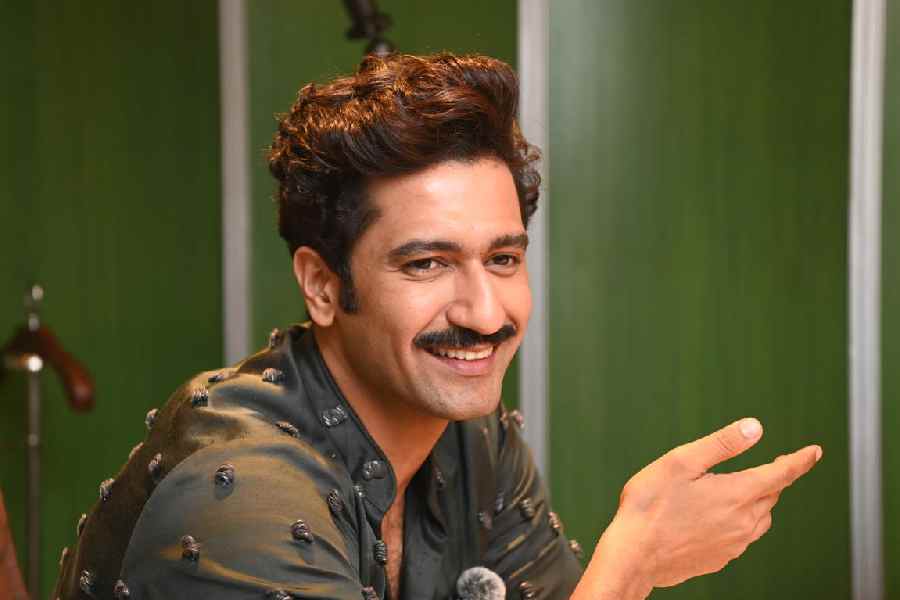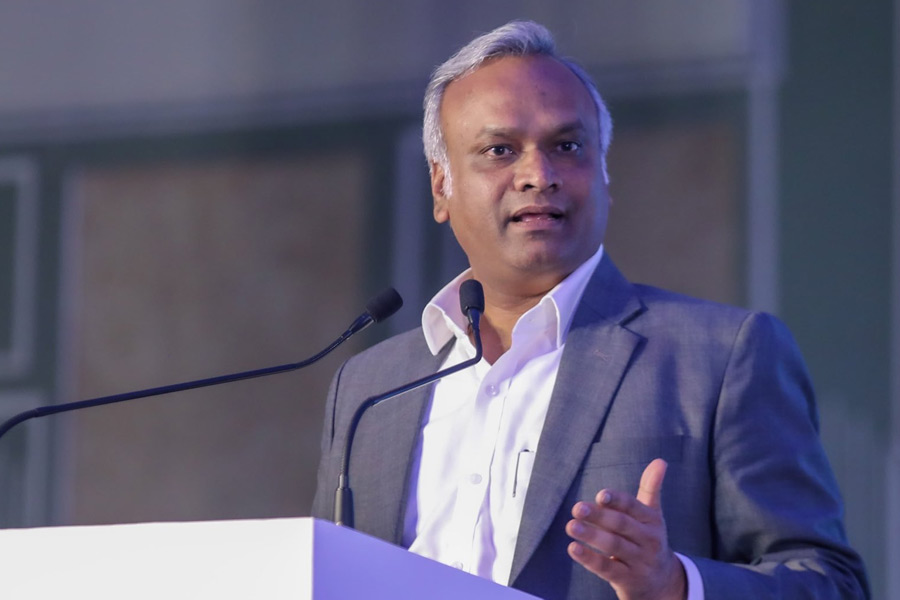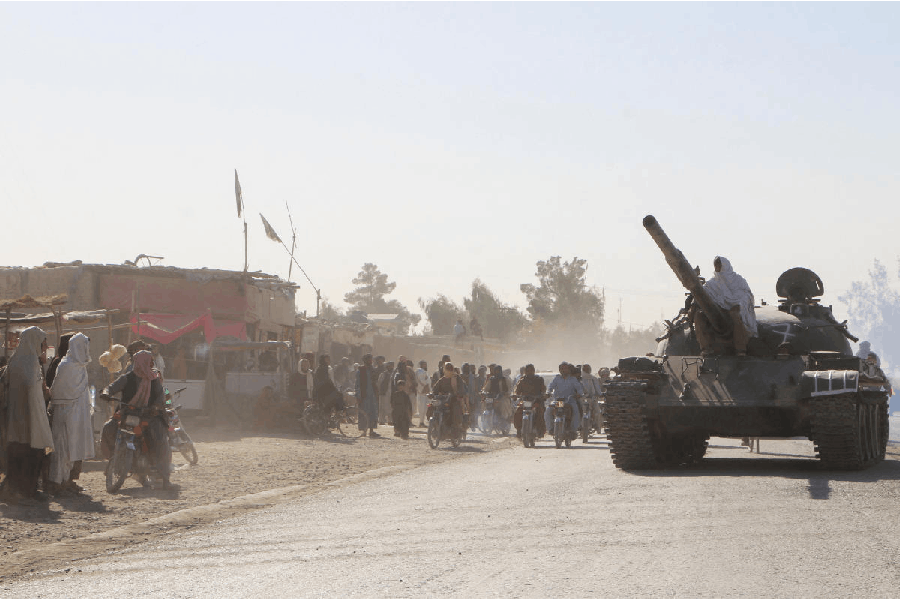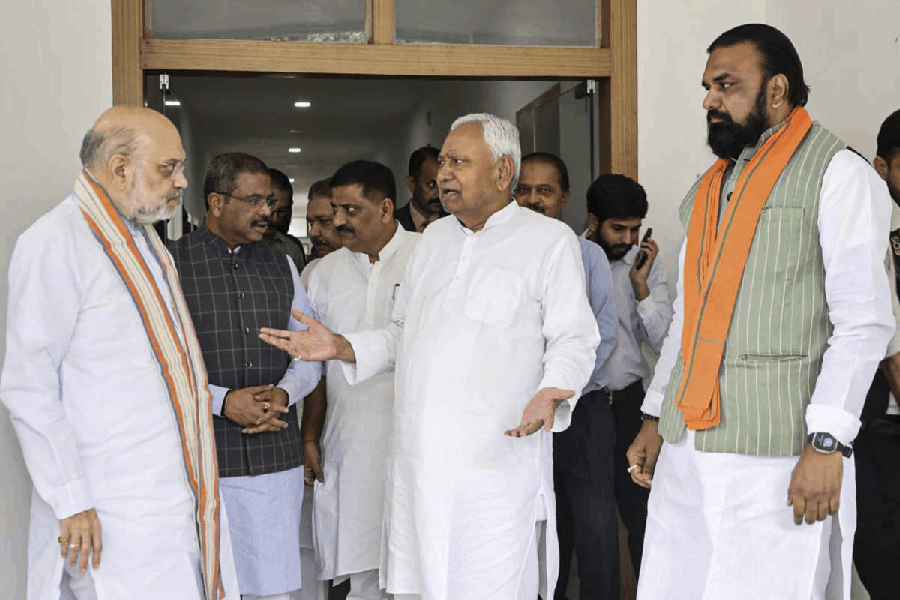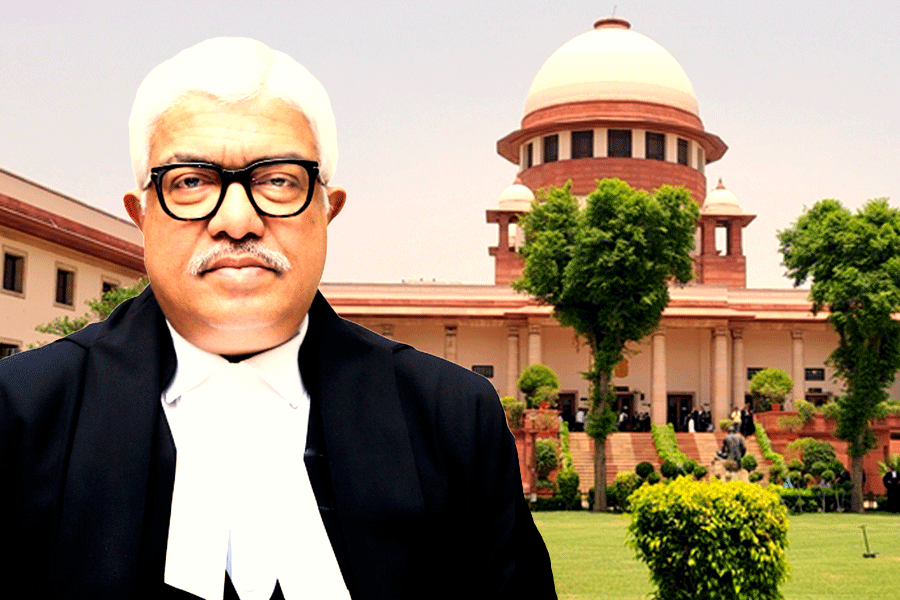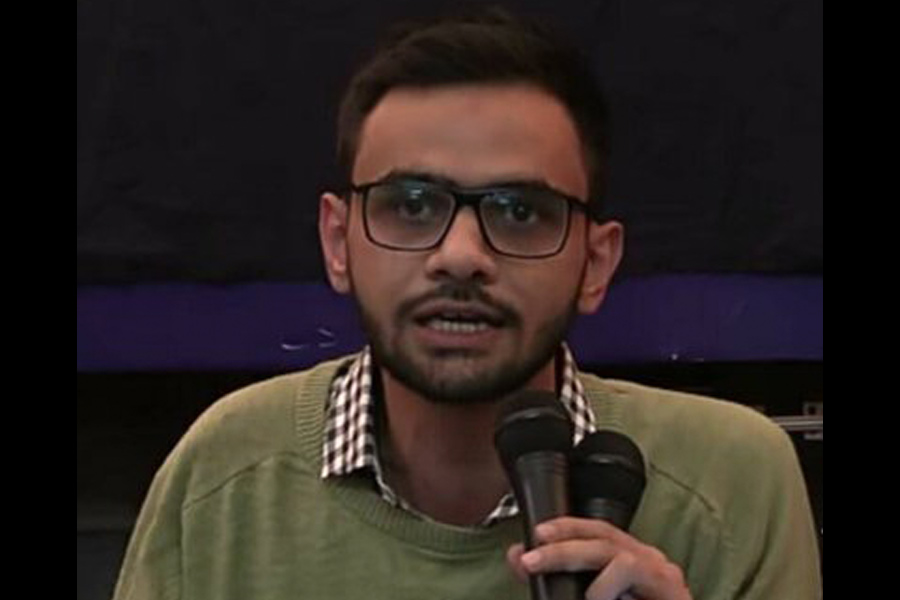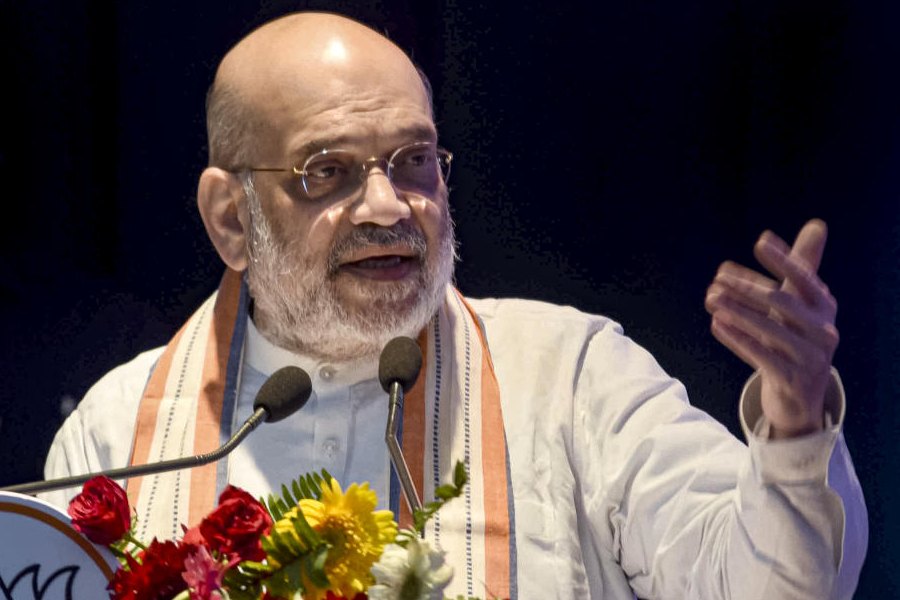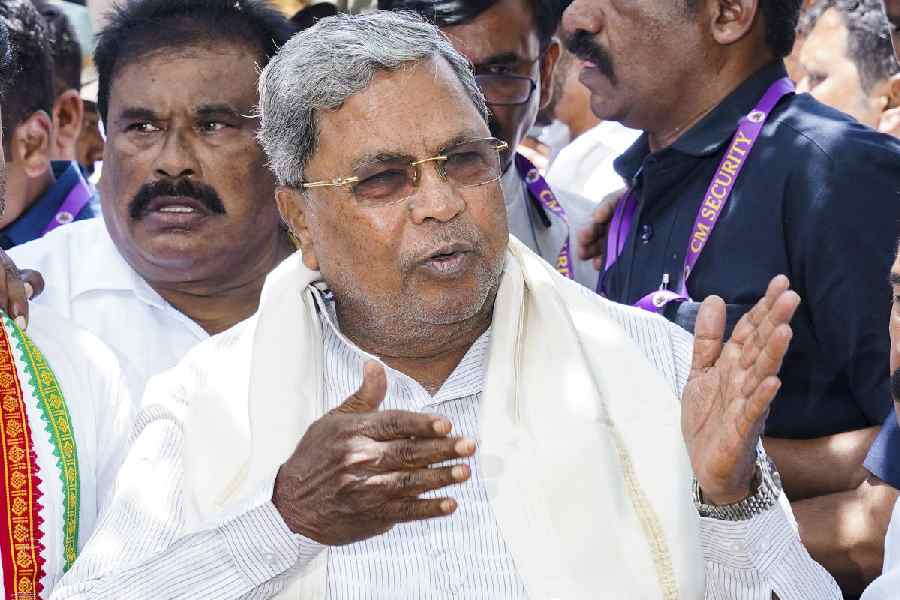How can I come to Calcutta and not catch up with you guys?!” Vicky Kaushal told Team t2 as he walked into Avartana at ITC Royal Bengal for a chat with us. Dressed in a grey kurta with matching silver-coloured tapered pants and sporting a moustache that defines his look in his upcoming film — Sanjay Leela Bhansali’s Love & War — Vicky was in Calcutta last week to promote his February 14 biggie Chhaava — the historical in which he plays braveheart Sambhaji Maharaj, the eldest son of Chhatrapati Shivaji Maharaj.
Over a freewheeling chat peppered with everything from history to gastronomy, Vicky spent a fun evening with Team t2. What made the occasion even more special? A Chhaava-themed cake, courtesy Frosted Delight, that Vicky just couldn’t have enough of, as he went click-click! His parting words: “You guys always make for the best conversations. It is always so relaxing. Thank you.” Thank you, Vicky! Excerpts from the chat.
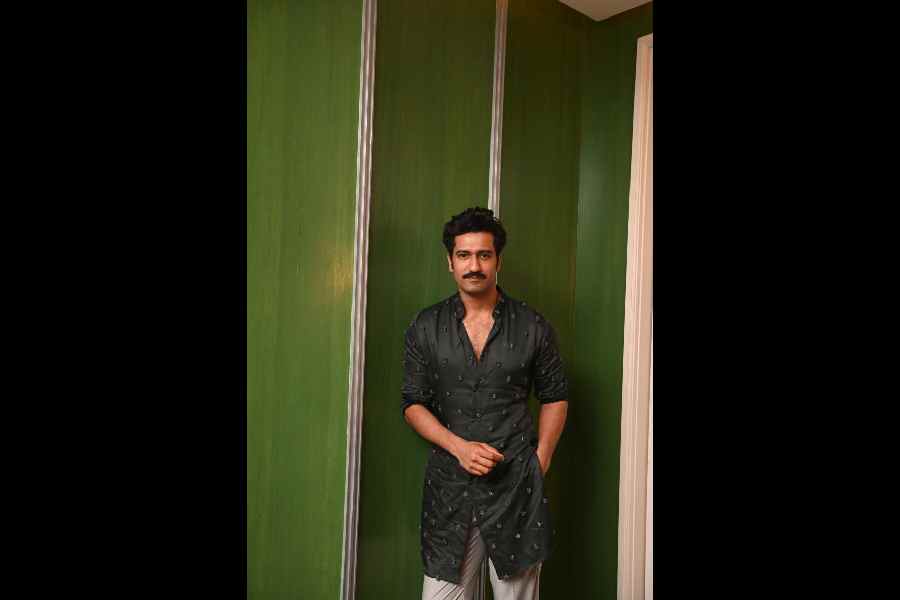
Vicky Kaushal
Priyanka Roy (Team t2): Every time we see you, you look different. When we met for Sam Bahadur, you had your Chhaava look and now during Chhaava, you are in your Love & War look. Is there a personal Vicky Kaushal look or does that not exist anymore?!
Vicky: Every Karwa Chauth, there is a ‘new’ Vicky Kaushal! There is a joke in my family that I do every film announcement during Karwa Chauth! Like saying: ‘This is my current look and this is the film I am doing!’
Priyanka: So this Karwa Chauth, we will know which film you are on to next...
Vicky: Let’s see. I am shooting for Mr (Sanjay) Bhansali now (with Ranbir Kapoor and Alia Bhatt). Luckily, he doesn’t finish shooting very soon. So maybe this will be the first time I will be repeating a look! (Laughs)
Honestly, I haven’t had a personal look for a very long time. Otherwise, it is definitely having a beard all the time. I hate being clean-shaven. My wife (Katrina Kaif) hates it when I am clean-shaven and so does my mom. So when I am not shooting, I sport a beard and short hair. Those are my basics.
Priyanka: Why don’t they like you being clean-shaven?
Vicky: Let’s just say that being my family, they are sweet to me. They don’t say it in a very curt way but they just tell me that I look better with a beard (laughs). I can totally understand.
Pramita Ghosh (Team t2): What made you say ‘yes’ to Chhaava and what do you think sets this historical apart in its genre?
Vicky: First, the awareness of the glory of Chhatrapati Sambhaji Maharaj. I was aware of the story, his sacrifice and the end he met with. I know that the story is very high on emotions and drama. For me, it was a no-brainer (to do the film). I didn’t wait for it to reach the script level... there was nothing like: ‘Oh, I will decide to do the film after reading the script.’ We were shooting for Zara Hatke Zara Bachke, of which Laxman sir (Laxman Utekar) was the director and Dinesh Vijan was the producer. During that shoot itself, Laxman sir had told me what he was working on next and he said: ‘I want to make it with you.’
For me, it is a real blessing to get this opportunity. Once I came on board, it was all about: ‘How do we achieve this? How do we achieve that? When do we start prepping for this? How much time is good?’ Playing Chhatrapati Sambhaji Maharaj is an honour.
Our attempt has been to bring out the story in the most authentic, most unapologetic and in the grandest way possible. We wanted to tell the story in a global manner rather than limiting it to a region or country. We want people across the globe to know the heroes we have had in Indian history. While shooting Chhaava, the attempt has been to keep it raw and real but also very grand. It is not opulent or glossy. You will see the dirt, the blood... you will see everything that happens in a battle.
A lot of the action sequences in Chhaava have novelty because the Maratha warriors had guerrilla warfare tactics and they used nature for their own benefit. So, you will see action happening in the forest, in the river, in the mountains, in the mud, fire.... There is also a lot of real crowd work that has gone into one of the action sequences in the film where there are about 2,000-3,000 people and none of it is crowd multiplication (using VFX). There were really that many people in one scene alone, of which we had 500 of the best stuntmen in the country who did the action bit and we also had a lot of junior artistes and background artistes.
Whenever we had a battle sequence, it was a conscious decision to show the crowd in a claustrophobic way. The terrain was such that they had to fight in compact spaces and on uneven ground. So, a lot of the action in Chhaava will make you feel claustrophobic, it will make you feel like you want to catch your breath. It is dirty and raw.
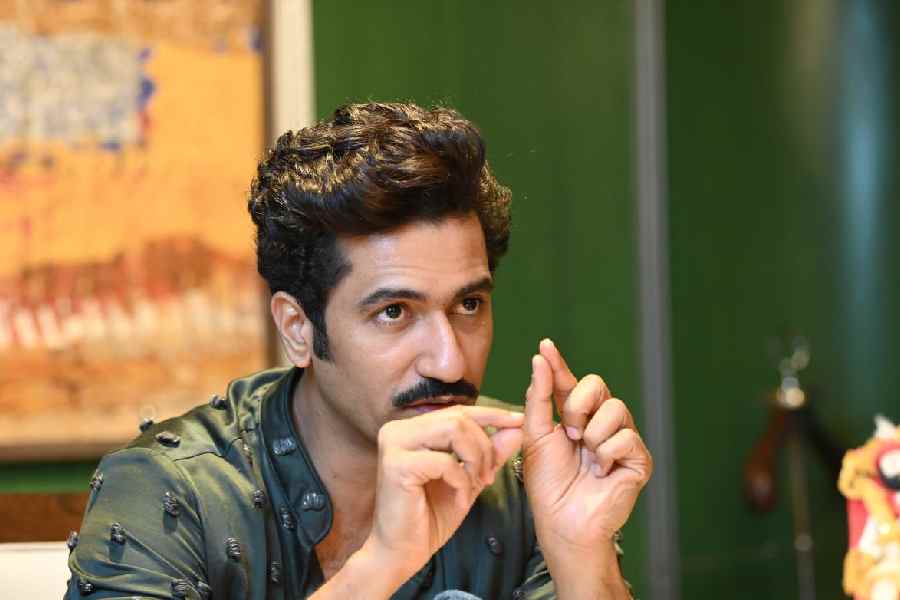
Vicky Kaushal
Priyanka: In many historicals, especially in war scenes, aesthetics are preferred over authenticity...
Vicky: Exactly! For example, the sky shots that you will see in Chhaava are on real locations. Of course, we had some set-building, but very little VFX has been used. The grammar is very tricky... to make you feel that it is a grand film but keep the realism intact and that our DoP (director of photography), Saurabh Goswami, has done beautifully.
Subhalakshmi Dey (Team t2): Our history textbooks tell us very little about Sambhaji. Are there any lesser-known aspects or anecdotes about him that you can share with us?
Vicky: A lot! Before this film, I knew certain things about him but not in detail. Like, I had no idea that he knew more than 13 languages! I didn’t know that by the age of 16, he had written books and penned poetry. He was a scholar. I didn’t know that he fought his first battle when he was 16 and that he had fought 127 battles and lost none. And all this by the time he was only 30.
It is not even a footnote in our history books. I am 36-37 and I feel I haven’t done anything! He became king when he was 21-22 and in the nine years after that, he fought over 100 battles. In the last 10 years, I have made 10 films... Sambhaji fought 127 battles! It is shocking that nobody had made a film on him before us.
It is all thanks to Laxman sir and Dinu (Dinesh Vijan) sir who have really been the force behind this and said: ‘Okay, we need to make this and we need to make it with a certain scale and grandeur’. I was blessed that Laxman sir told me: ‘Tu hi ‘Chhaava’ banega.’
Farah Khatoon (Team t2): How did you balance the emotional intensity required for this role with the need to also convey vulnerability and sensitivity?
Vicky: I think any kind of intensity always comes from vulnerability. Be it a king, be it the role of a peasant, a farmer, a military guy or even a superhero, it is always the wounds and the vulnerability — and not the bravado — which make it human and relatable.
It was important to crack those aspects in this film. I wouldn’t want to reveal those aspects right now because it really is the emotional core of the film and of the character. Even the dialogues, it is all in the eyes.
When it comes to deeply emotional moments, I would depend a lot on my director and writer because if there is a scene where you have to portray vulnerability, it is not like you prep for it at home and then you carry that emotion to set. It depends pretty much on what you feel when you are in that costume, in that make-up. And once you go on set, you just have to make sure you are not distracted. You follow what the director tells you to do.
Zeba Akhtar (Team t2): The war scenes are very visceral and larger than life. A lot of energy must have been needed to execute them. You bulked up big time for Chhaava. What was your exercise and diet regimen like?
Vicky: We went on the floors after seven months of a very disciplined lifestyle, be it diet, gym training, action training, horse riding.... So, by the time we reached the set, the momentum of being disciplined had already been set into motion. Since we shot on real locations, we needed daylight and so we would start shooting very early. We would shoot from 7am to 7pm and there was so much physical exertion through the day that I couldn’t do my training after that. So I used to wake up at 4.30am, train before starting the action, then do action all day and then make sure that I was asleep by 9pm. I followed this regimen for months.
Basically, you don’t have a life anymore when you are shooting this kind of a film because it demands so much from you. There is absolutely no social life, very little family time. But it is the least that I could give to a role like this.
Priyanka: Though they are firmly entrenched in the movie business, how does your family react to this strict regimen that you follow during shoots?
Vicky: They are all very understanding. Like you said, they all understand what it takes for this kind of commitment. What needs to be done has to be done.
Priyanka: You had played a dark character in Raman Raghav 2.0 and I remember you telling me that the weight of the character had changed your personality and your mom would be very worried about you...
Vicky: Yes. What happens with me when I play such roles is that I go a little bit silent. That is because one’s mind and body gets so consumed by what one has done for 14-16 hours that it is difficult to just snap out of it and be completely normal. Most days you can’t, some days you can. The best I can do is come to a neutral ground. It won’t be the exact opposite because even in your off time, you are constantly thinking about the next day. But I also enjoy that because I love shooting at one go and in that you go into autopilot mode. Also, the character starts giving back to you when you are in that zone and I really enjoy that.
Pramita: And you generally always make one film at a time, right?
Vicky: Yes. I think very rarely these days any actor shoots for multiple films at the same time. That format has changed in terms of shooting style, shooting hours... actors are committing to a certain look for a long time....
Subhalakshmi: Every actor brings something personal to a character. What aspects of your own personality did you channel into Sambhaji, and what’s the one defining quality of Sambhaji that you believe the audience will deeply connect with?
Vicky: At the end of the day, every character is derived from the actor playing it. You are never going to become him but you have to form an illusion for the audience. So much so that eventually when you are sitting in that black box in the theatre, you feel that you became him. Everything has to come from within you. If that character is happy, it is going to be your version of what it would be like to be happy. Every person has all the colours, all the rasas. You have to decide that this is your character and these are the set of colours that are dominant for that character. Then within you, you find and switch that on and say: ‘Okay, now for these 12 hours, while I am this character, these are my dominant colours because that suits and aligns with this character’.
It is about being honest to that emotion, being honest to that colour.
Priyanka: From what we can see in the trailer, Akshaye Khanna makes for a great Aurangzeb... he is barely recognisable. Is it true that you and Akshaye didn’t talk to each other on set because you wanted to maintain the dynamic the characters share on screen?
Vicky: We have very limited scenes together. Those who are aware of history would know that Aurangzeb tried to find Chhatrapati Sambhaji Maharaj for nine years and he could never find him. When he does capture him, that leads to the third act of the film. Even between shots, because of how intense the shoot is, we were not in the headspace to make conversation about, say, the weather. The atmosphere was such that nobody would start being frivolous and have random conversations. Woh mahaul hi nahi tha set pe.
For him, there was so much prosthetic work and so much make-up going on, that it was anyway difficult to do anything else. Every little movement disturbs something and then there is a lot of time that also goes into correcting it. As an actor, you prefer to be silent so that you don’t have to waste time in doing touch-ups again.
Priyanka: Is it possible to have a conversation with him about the weather anyway? He is pretty reserved...
Vicky: I will find out after release when I get to chat with him on a personal level (smiles). The first thing I will ask him is: ‘Sir, how is the weather in Alibaug?’ That is where he stays.
Pramita: If you could travel back in time and meet Sambhaji Maharaj, what would you ask him?
Vicky: I wouldn’t have the guts to ask him any question or look him in the eye! There is a Marathi phrase called Manacha mujra, which means ‘respect’ or ‘honour’. I would bow my head and pay my respect to him and just quietly feel his aura. Baat karne ki toh himmat hi nahi hogi!
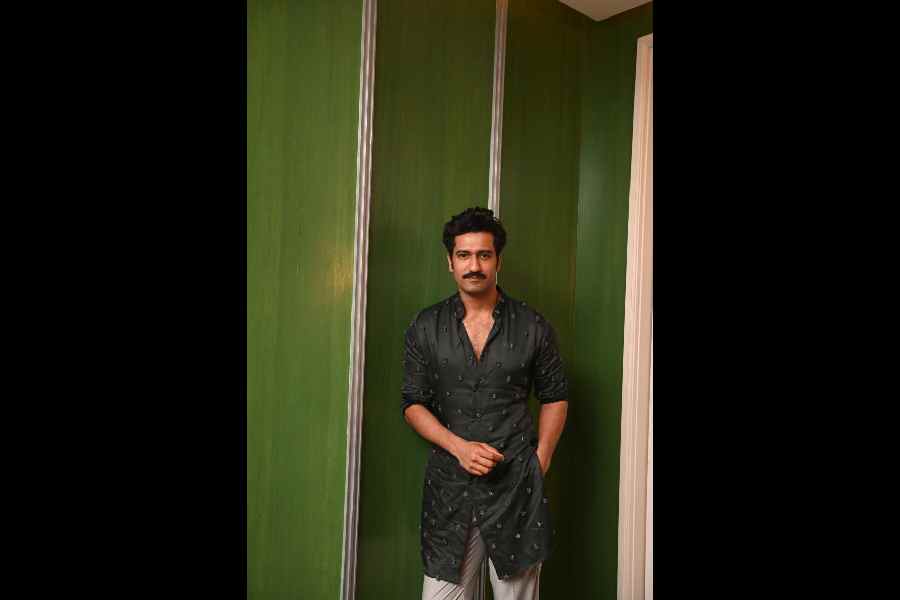
Vicky Kaushal
Farah: Sardar Udham to Sam Bahadur, given the powerful real-life characters you have played so far, do you feel a special attraction towards non-fiction stories?
Vicky: I think so but I can never put a logic to it. But somewhere, I do get attracted. Even while reading, my favourite genre is memoirs. Unsung heroes attract me. I like the fact that this is not created... it actually happened. It adds gravitas. I like playing real-life heroes because I feel it is a way to give back to society as an artiste, in a very small way. It is, of course, entertainment, but there is also information. Through these films, there is a certain section of audience who comes to know who Sam Manekshaw was, who shaheed Udham Singh, who Chhava were. In some way, I feel I am doing my bit to give back something.
Zeba: Do you make the decision to do or not do a film by yourself? How much of a role does your family, especially Katrina, play when it comes to deciding on a role?
Vicky: It is pretty much my gut feeling. I do confer with them when I am 99 per cent sure I want to do a role and I want the remaining one per cent of the push to come from them. But it has never been that I am one per cent convinced and I am looking at them for the rest of the 99 per cent. Eventually, I need to be convinced about a role and a film in order to convince the audience. Once you do that, every day of shoot, you are put to test with that conviction. It is not that I need to feel excited today and then it is going to be fine. I need to feel excited for a year from now if I commit to a role. I need to feel convinced for a year.
For me, the benchmark of my passion for a film is the director’s passion or excitement to make that particular film. I try to top that every day... I want to feel that I want to tell this story more than my director wants to tell it. That can’t happen if it doesn’t come from your gut. I really need to feel it in my bones that I want to be part of a film. On the days that I am almost there, I need a push from Katrina, or even from my dad (Sham Kaushal). Both of them are able to give a very audience-like third-person point of view. They can see things from the inside as well as outside.
Subhalakshmi: It is unlikely because all your films have been quality films, but we hear a lot about actors who get into a project and then it doesn’t turn out to be the way that they had thought it would, for various factors. How does one still keep at it? There is of course professionalism and dedication but how do you keep yourself invested if you feel that something’s not going the way it should have?
Vicky: First, you don’t have an option. Because when a film is releasing, you are already shooting for another film… so you don’t have an option to indulge in the success or the failure of the film. That is a great thing for an actor because if it is a success, it won’t go to your head and if it is a failure, it won’t go to your heart. Secondly, you can’t do anything about it. You can just take your learnings.
Till the release date, the film is mine and my team’s. But from release day, it is purely the audience’s film and what they want to do with the film... how much they want to like or dislike it... and you have to take that. Because it is for them. They are not biased or unbiased towards you. They want to watch a good film.
They are coming in hoping and wanting to have a great time. So if they didn’t have a great time, it is not personal. They spent their money to have a great time. So, that is their verdict. You just have to take the learnings from that and apply it to the film that you are shooting at that time. You need to say to yourself: ‘These are the things that didn’t work, these are the things that they liked. Let me just learn from it and cultivate that in future projects.’
Priyanka: July will mark 10 years of your debut film Masaan. Do you remember your first day of being Deepak?
Vicky: I have had a very interesting start. Journey toh interesting rahi hi hain, the start was also very interesting. The first time I ever faced the camera, you don’t even get to see me in the frame... I am just a silhouette behind Richa Chadha in Gangs of Wasseypur. After that, I had a small two-scene role in Luv Shuv Tey Chicken Khurana. Then I had a blink-and-you-miss role in Bombay Velvet where I was standing behind Kay Kay sir.
Toh mujhe na aisa kabhi woh Day One yaad nahi aata because woh itne chhote chhote roles se maine shuruaat kiya hain ki mujhe aisa kabhi nahi lagta hai ki haan yeh aisa hai ya aisa tha. Of course, woh Gangs of Wasseypur waala din yaad hain. I kind of seeped in and started. It was never like ‘boom’... and I was launched. It was just kind of baby steps and then dheere dheere woh chalna shuru hua.
Priyanka: Masaan was a very unconventional debut…
Vicky: Very unconventional. We weren’t even sure whether the film would release... and then it went to Cannes! I never imagined that the first time I would see myself on the big screen was going to be in France on the biggest screen in Europe! Never imagined! And that’s how my last 10 years have been. If you had told me back then that in four years’ time, I would be working with Rajkumar Hirani, I would have laughed at you, or that in 10 years’ time, I would be doing a historical (Chhaava) where I would play a king and a warrior riding a horse and using a sword, I would be like: ‘Arre yaar, paagal hai kya? Yahaan steadicam aa raha hain, main khush ho raha hoon! Kahaan main itni badi film karunga?!’
I always feel God’s plan is the best plan. So I have stopped limiting myself in terms of: ‘How do you see your next five years or 10 years.’ I don’t see it only! I have God seeing it and I trust him fully and my job is to just focus on my work and do it. Toh main just karam kar raha hoon. But yes, the last 10 years have been just beautiful!
Farah: What would you tell Deepak if you met him today?
Vicky: I hope, and I am sure that his journey in his professional life after going to Allahabad has been as beautiful as my professional journey has been from Masaan. It would be lovely to meet Deepak that way.
Priyanka: And hope his ‘dukh’ is over, finally!
Vicky: I hope so too. I cried my eyes out (in the scene from Masaan)!
Pramita: We have to ask you about the Tauba tauba step that broke the Internet. Did you ever imagine that it would become this big?
Vicky: We were hoping for it. We were praying for it. It is not like I dance in every film. We were really hoping that some magic would come out of it. Everything came together in a really good way, I felt. I remember when I saw the step for the first time, I went: ‘Woah!’ And then I was like: ‘Woah, yeh hoga kaise?!’
Pramita: Did you practise a lot?
Vicky: Woh ho gaya tha! There was a trick to it which Bosco (choreographer) told me and woh ho gaya! But I am not a trained dancer, so I always get nervous! That it caught on in such a huge way is very strange because that step, in the whole song, comes only once. Usually the hook step comes repeatedly, but this only comes once in the middle of the song. But we are just really thrilled and happy that Tauba tauba has become so big and all thanks to the audience for that. Also, Karan Aujla made a really good track.
Priyanka: You said you like reading memoirs. Is there anything that you read recently and liked?
Vicky: Not recently, but during quarantine, I used to read a lot. Shoe Dog (A Memoir by the Creator of Nike, by Phil Knight) is one of my most favourite books ever. There is a memoir of Rakesh Maria (Let Me Say It Now). Absolutely incredible. Those are actually two of my most favourite memoirs.
Zeba: What are you watching now?
Vicky: I just watched The Day of the Jackal. It is stunning! And now I am watching Paatal Lok 2. Jaideep (Ahlawat) is so good!
Farah: If there was a day when there was no dietary restriction, what would you have for breakfast, lunch and dinner?
Vicky: This is the most amazing question I have heard in my life! Breakfast would be eggs and potatoes, sometimes parathas. I used to love aloo ka paratha but now methi roti has gone thoda upar. And then it has to be followed by my first cup of coffee, which is dearest to me. Lunch is usually rice and chicken or dosa and some chicken preparation with coconut chutney. I love dosa! Lately, I have realised that gluten is not very suitable for me, which being a Punjabi is sad... atta jab tak andar nahin jaata hain na humein samajh nahin aata hain ki khaana khaaya hain!
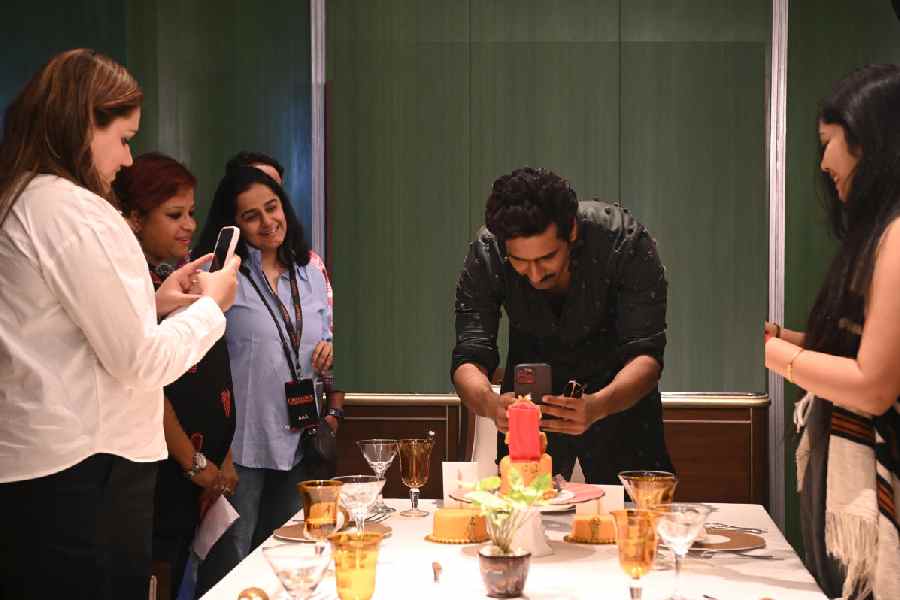
Anyway, now I am having methi roti because that is made with corn flour. Thoda sa edge pakad liya hai usne and it is also yum. Shaam ko, I will have some snack which is slightly on the healthier side... a sandwich or something. And then raat ko, sometimes it’s again dosa! I play around with potatoes, rice and dosa. And then for dessert, ice cream is always my go to. I also love maa ke haath ka gajar ka halwa…
I love coconut ice cream. I love nolen gur... that’s my plan after this chat! ITC, by the way, has great nolen gur. So I get very happy when my team says: ‘ITC mein ruk rahe hain!’ What I also love is mixing vanilla ice cream with gulab jamun and gajar ka halwa! Three-in-one dessert!
Subhalakshmi: For someone who loves to eat so much, do you also cook well?
Vicky: I can do stuff with eggs... omelette, bhurji, scrambled eggs... basic breakfast. I learnt the basics during quarantine because at that time, I would be up all night watching movies. Now who would make me anything at 3am? So I would cook eggs for myself, I can also make tea. Apart from that, my mother tells me: ‘Please don’t go into the kitchen. Stay out of it!’ (Laughs)
Priyanka: Have any of Katrina’s food favourites become yours now and vice versa?
Vicky: Pancakes! We have ‘Pancake Sundays’. Methi parathas, she also really enjoys. We are very happy eating gluten-free methi parathas. Mom serves with white butter and Katrina really loves that. I think white butter is an emotion for everyone and ever since someone told me that this is good fat, I am like: ‘Bring it on!’

